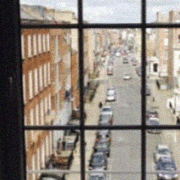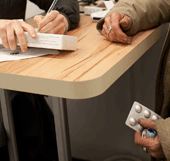
Making health equity a reality through research, education, policy and practice
Original Article

Health care on the move – bringing services to those in need
by Dr. Austin O’Carroll, PHE
Safetynet was set up in 2005 to develop primary care services for homeless people, run by local GP’s and located within 14 homeless services (food halls, hostels, drop-ins etc.) throughout Ireland. It was identified that a significant number of rough sleepers did not attend the new services. In order to address this deficit, in 2009, Safetynet, in conjunction with 3 other voluntary agencies (Dublin Simon, Chrysalis and the Order of Malta) developed a Mobile Health Clinic for rough sleepers offering routine primary care and a needle exchange. It operates three evenings a week. This clinic has seen over 1200 patients per year since its inception.
The clinic is staffed by GP registrars. The aims of higher level education include increasing the awareness of social justice and societal inequities and addressing prejudicial attitudes displayed by students towards marginalized groups. Enabling students to have contact with people experiencing such inequities has been shown to increase their awareness of social justice issues and change negative stereotypes of groups such as the elderly, people with HIV/AIDS and those affected by poverty. It is widely accepted that there are very negative stereotypes of homeless people including them being “male, lazy, morally bankrupt, and potentially dangerous” or unmotivated, work-averse; uneducated, and often alcohol, drug-users or mentally ill.
Recently we conducted a survey of users of the service and also focus groups to explore the learning of GP registrars. The questionnaire had a 79% participatory rate (116 of 147). The gender distribution was even (53% male, 47% female) and mean age was 34 years old.
Over half had no Medical Card due to reasons including administrative barriers (57%), having other priorities (17%) and refusal by GP’s to sign their application (7%). Forty three percent did have a GP but many of these faced difficulties in accessing their GP due to issues such as distance, the necessity for an appointment and perceived bad attitudes of the GP or their staff.
Fifty one percent would have received no treatment if the clinic had not been there. Sixteen percent would have gone to the Emergency Department and 8% a Safetynet fixed site clinic. Over 90% of patients rated the service ten out of ten mentioning in particular the non-judgemental nature of the clinic and the convenience.
Original Articles
Reseach
Education
News & Views
Conferences
The GP registrar focus groups revealed that the registrars found working on the mobile clinic did challenge their prejudice. They developed more positive attitudes to homeless people. “You have a kind of a cliché in your head of what the people are like and what their backgrounds are and actually, you’d pass them in the street, they’re obviously normal people, exactly the same as any of us, you know, and it’s just the way they’ve kind of – their lives have gone.” They found that they had a more human attitude to homeless people which contrasted with how they perceived them in hospital settings. “I think it maybe humanises them a little bit more, you know, you’re one on one, they’ve come to you on the bus and it’s just you whereas in A&E it’s a bit of a – as I say group mentality so maybe when the person’s sitting in front of you and you hear their story it just humanises them a bit more.”
Registrars also talked about how the clinic made them aware of homeless people’s tenuous existence. “I suppose it’s something I hadn’t really thought of before because...in the practice I’m in anyway, you don’t get people who are homeless walking in...so it’s just something that’s not on your radar at all and you could easily go through 40-whatever years of practice and never actually think about it so I think it’s something that, it does get you thinking.” This helped improve their empathy for homeless people. “Just people’s sad stories, how they ended up as they are and that they’ve been thrown out of their family homes and they’re addicted and they’re pregnant and they’re 18 and they’re living in a hostel and their boyfriend is living there too and they have Hepatitis, it’s just awful, so it’s more the individual people and what sad stories they have.” The improved empathy also enabled them to be more tolerant of homeless people’s challenging behaviours when seeking access to healthcare. “If you are going into, setting something up for homeless people, you have to realise that it’s, first of all it’s going to be a huge challenge, it’s also going to be quite frustrating both from the point of view of the access to the service but also the people that you’re dealing with have kind of chaotic lives anyway so you may go out of your way to organise things and they don’t turn up for it, it’s frustrating and so you have to be aware of that before you go in otherwise you get angry at both the system and at them and then you’re helping nobody and getting yourself into a state about it all.”
Registrars commented that they could engage in a more holistic way with homeless people on the bus. They noted that their relationship on the bus was different with the homeless person in that they were more likely to hear the full story of the homeless person’s life on the bus than in the hospital setting. “I’d say most times I’ve ever come across them before have been in A&E departments and it tended to be frequent attenders and it was kind of, you had a busy A&E department, you weren’t really their kind of background, you just really wanted to get them in and out and sorted and you kind of almost had a heart-sink feeling when you saw them.”
Registrars said that this experience would change the way they approached such patients in the future. “I think you’ll just be more conscious – as I said I wasn’t, you know, aware of how poor the access was, you’d like to be more conscious in your practice of not excluding groups and kind of improving access and just where you’re working being more open-minded and trying not to stereotype people.”
The experience of working on the Mobile Health Unit did result in some registrars considering the possibility of working with homeless people in the future. “I would like to work in an area where people are very disadvantaged and where they knew that you were trying to improve access to everybody in the community no matter what their circumstances are and I wouldn’t want to work in a practice that didn’t take on homeless people or had a policy of not providing care for them. So yeah, I mean it’s definitely something that I would like to continue to do, I don’t know in what kind of environment though.”
In summary, the Mobile Health Unit has reached over 6,500 homeless people since it’s launch in 2009. It has reached a cohort of homeless people who had very poor access to primary care. It has also served to challenge and change negative attitudes of GP registrars towards homeless people and to actually engender a desire amongst registrars to work with homeless people in their future careers.
Please see Ciarán D’Arcy’s article in the Irish Times about this initiative.








